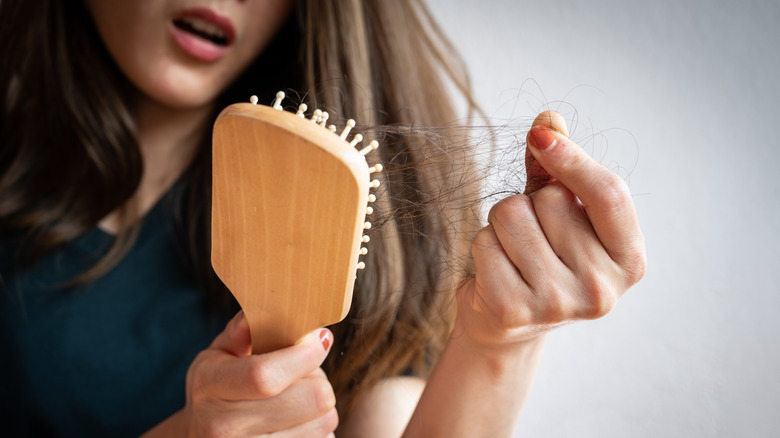What It Really Means When You Want To Eat Hair
Hair can be deadly, especially if you tend to consume it orally. In fact, a 16-year-old girl in England was reported to have died from a very rare condition called Rapunzel syndrome, according to Live Science. The girl was found to have a large hairball in her stomach which had caused the lining to become inflamed. This led to inflammation throughout her entire body and her organs shut down.
This condition occurs mainly in adolescent girls with mental illness, as per Frontiers in Pediatrics. They note that it often escapes detection because people don't exhibit any symptoms in the early stages. It is named after the fairy tale character Rapunzel, who would let down her long locks each day to allow the evil witch who imprisoned her to climb up and visit.
The problem with hair eating, according to Healthline, is that hair does not break down in the digestive tract. It can build up over time, blocking the intestines or causing ulcers to form.
People who develop this syndrome have what is known as trichophagia, or compulsive hair eating, as per TrichStop. Trichophagia is thought to be caused by a chemical imbalance in the brain and is usually treated by antidepressants and therapy.
Why people eat their own hair
In some cases, trichophagia may be related to pica. One 2021 case study reported in the National Library of Medicine discusses a toddler with iron deficiency anemia who compulsively ate hair and paint chips. People with pica may compulsively eat non-food items due to nutritional deficiencies like iron and zinc, according to the Family Doctor.
Trichotillomania, the compulsion to pull out one's hair, also appears to be related to emotions (via Mayo Clinic). For some, it can be a way to relieve uneasy feelings like anxiety, loneliness, or frustration. People may also do it because they find that it feels good to them.
While it is not entirely understood what causes people to eat their hair, WebMD noted that the condition often begins between the ages of 10 to 13. It is more likely to occur if someone else in your family has it as well, so there may a genetic component to it. Other mental illnesses like anxiety, obsessive-compulsive disorder, and depression are often linked to it. It can also be triggered by episodes of extreme stress.


